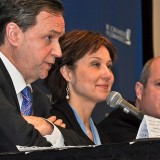Picture this: It’s 2012 and you live half way around the world – let’s say, Sydney, Australia. You open up your Facebook page to find a new viral youtube video out of BC, shared on your wall just moments ago by a friend in Canada. With a click of the mouse you find yourself watching footage of heavily armed mounties in riot gear advancing on a dirt road blockade – made up of indigenous peoples and a varied band of supporters.
The video tells you it’s somewhere in Tsilhqot’in Territory, west of Williams Lake, BC. It might as well be Timbuktu – it’s the people, the situation, the deeply human experience that you, like millions of others around the world, are tuning into.
An iPhone camera documenting the scene pans over to a First Nations elder – a grandmother of the Xeni Gwet’in people of the Tsilhqot’in, firmly planted in her wheelchair, staring down the police and trucks carrying mining equipment parked behind them. Shutters snap thousands of hi-res images of the unfolding drama. One of the policemen bellows orders from a megaphone, something about a final warning, lost in the chants of the protestors – which go something like, “The world is watching!”
Then, the moment of truth: A gang of jack boot and baton-clad officers emerges through a fog of freshly deployed tear gas, descending on the protestors, who have formed a human chain around this grandmother…
I’ll leave the rest to your imagination.
Within the hour this clip, from one of many cameras documenting the confrontation, has been uploaded to youtube and shared through facebook, twitter, email chains, etc. The footage is so graphic, so viscerally archetypal in nature – a classic David-vs-Goliath scene – so perfectly capturing the injustice of the situation, that it’s hard not to react to it. Activists and independent media in BC forward it furiously to their Canadian and International contacts – including media.
Soon, producers at major international outlets like the BBC are downloading HD quality images and preparing news stories – which are as much about the viral video clip that’s shocking the world as the violence itself over a mine in BC.
The eloquent chief of the First Nation whose territory the mine would invade, Marilyn Baptiste, is fielding calls from everyone from Amy Goodman to Anderson Cooper. Within days, the governments of BC and Canada, the mining company, the already severely embattled RCMP have been indelibly connected by tens of millions of people around the world to the violent oppression of environmental protestors, among them aboriginal grannies in wheelchairs.
And by the time these parties realize what hit them, it’s too late – they have lost all control of the story. It’s now an international spectacle. And guess what? Forget about that mine. It’s done like dinner.
A little far-fetched, you say? Allow me to explain.
I raise this hypothetical scenario not to shock or scare, and certainly not to incite the type of situation I describe – quite the opposite. I present it because this is exactly where things are headed at this very moment – based on our present trajectory. My colleague Rafe Mair has been prophesying this unfortunate conclusion for years now – in these pages and before that – and, sadly, I too have come to envisage the same inexorable results from the bad decisions being made by our politicians, on this issue and many others.
As for Fish Lake/Prosperity Mine, it’s mostly the fault of the BC Government, first under Gordon Campbell, now under Christy Clark – who continues to astonish by out-doing even her predecessor in the contest to be the premier with the worst environmental record in BC, perhaps Canadian, history (she’s probably neck and neck with Ralph Klein at this stage, but Christy’s just getting warmed up). Let’s review the Campbell/Clark Government’s record on the issue with a brief timeline:
- First, the BC Government quickly and painlessly approved Taseko Mines’ plan to destroy Fish Lake for its “Prosperity Mine”, only to be embarrassed in late 2010 when the Harper Government rejected the same proposal following its far more extensive Federal Panel Review (the Department of Fisheries and Oceans, the Federal Environment Ministry and dozens of expert interveners and First Nations were all strongly opposed to the project).
- Then, a full six weeks before the Harper Government decided to grant Taseko a second shot at an environmental review early last week, based on an amended plan that doesn’t directly destroy Fish Lake (but is, nevertheless, as bad or worse ecologically than its predecessor, according to the First Nations), the Clark Government quietly issued work permits to the company to begin building roads and doing heavy-duty exploratory drilling. This was a breathtakingly provocative and inflammatory move by Premier Clark, amid an already highly charged atmosphere. Unbelievable, really – flouting the Feds, First Nations, and the people of BC in one fell swoop.
- Upon discovering this, last week, the First Nations filed a petition in the BC Supreme Court to suspend or cancel those permits while the project is still under federal review (a no-brainer, it would seem)
- This past Saturday, Chief Baptiste personally (and alone, I’m told, by solid sources) confronted Taseko’s trucks that had just moved into the territory to begin work. Having been informed by the chief that they were trespassing, the truck drivers turned around and left.
- Now this week, Taseko Mines has filed for an injunction against the Tsilhqot’in, seeking to bar the First Nations from preventing the company’s workers from entering their territory! At the same time, The First Nations have filed for a counter-injunction against the company. As you can see, things are escalating at lightning speed – with more hearings scheduled for tomorrow. It remains to be seen how the courts will rule – lord knows they’ve been put in a hell of a spot by the Province.
So it is at the feet of one Premier Christy Clark that the lion’s share of the blame lies – and will lie, if things get even more out of hand. But knowing how vehemently opposed the First Nations are to this project on their territory; knowing the litany of new problems with the alternate proposal – which has already been presented publicly through the original Federal Panel Review – the Harper Government should never have sent this project back for a second review. So both of these governments are complicit on some level in forcing the all-too-real hypothetical situation I’ve described here.
I say all these things now, knowing that at least some people within the Clark and Harper administrations will read this (and please help ensure they do, by forwarding this article to your MLA and MP). It is to them I’m speaking.
I implore Mr. Harper and Ms. Clark to recognize how the world has changed since the 1990’s-era Gustafsen Lake, Oka, and other relatively recent violent stand-offs between indigenous peoples and the RCMP and Sûreté du Quebec, still seared in our national consciousness.
Today, we live in the post-Dziekanski era – where one false move by law enforcement and governments is instantly on the public record for millions to see. The Surveillance State works both ways, you see; police can bring their cameras to intimidate protestors, but it is they who are really on candid camera now. (Though, I want to be clear: the police are mere pawns in this game – it is the politicians who drive the situation; and yet, the RCMP’s image is at an all-time low, which will likely make the media and public more ready to blame the police if things go sideways here).
Granted, there may be some instances where the public is divided on the rough handling of protestors by police – some instances, even, like Vancouver’s recent Stanley Cup Riot, where they collectively wish law enforcement took a harder line.
But this is a mine, after all – with undeniably severe ecological impacts; a mine which has already been rejected by the federal government; a mine which prompted an RCMP investigation into insider trading when millions of shares were dumped weeks in advance of the federal government’s rejection of it; a mine which First Nations, with very real and powerful legal rights, vehemently oppose; a mine which a significant majority of BC citizens also oppose. So the prevailing sympathy will be with the mine’s opponents if the conflict descends into violence.
If the Tsilhqot’in people and their supporters are smart – and they are, I believe – they will be preparing right now for the aforementioned scenario. They will take donations to purchase some affordable yet highly effective camcorders. They will train their membership in how to film, edit and upload footage to youtube; how to circulate it through email and social media. They will continue developing information trees, local and international media contacts (they’ve been extraordinarily effective at garnering media interest up to this point, party thanks to their impressive chiefs Marilyn Baptiste and Joe Alphonse). If they are smart, they will do the above – and they will wait.
They will wait and pray that our courts do the right thing and force Taseko to stand down – at least until the federal government has completed its environmental review of the company’s amended proposal. They will wait and hope the Clark and Harper governments come to their senses. But they will be prepared for the worst-case scenario.
With words bearing the full force of their conviction, the Tsilhqot’in have repeatedly demonstrated the resolve to stand on that blockade – even give their lives to protect their sacred land and water – and many supporters have already vowed to stand by their side.
But in addition to that, they will have the cameras ready to roll, the iPhones and laptops set to upload to the world the reality of the injustice being perpetrated upon them. And in the era of the UN Declaration on the Rights of Indigenous Peoples, the social media-fueled Arab Spring, Occupy Wall Street, Keystone XL and Enbridge protests, the world simply has no stomach for watching cops beat up good people standing up for the right values.
So to our provincial and federal governments – and particularly to Ms. Clark – I say, think long and hard before you venture any further down this road. It can only end badly – not just for the brave souls who will inevitably suffer through the sacrifices they make standing up for what they believe in – but for you, your government and your very legacy…not to mention Canada’s reputation in the eyes of the world.
For all our sakes, let us hope cooler heads prevail.







